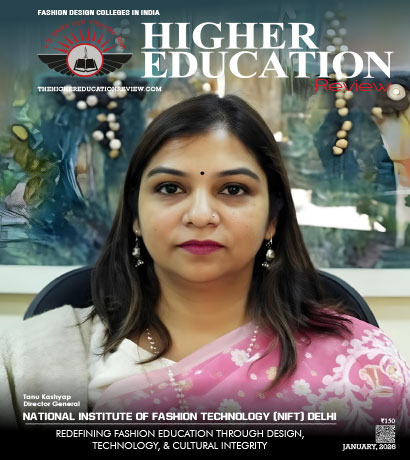Evolution of Management Education in the Digital Age
 Himanshu Rai has an extensive background, including leading academic positions at esteemed institutions such as SDA Bocconi in Milan, IIM Lucknow, and XLRI. He also has a distinguished corporate career at Tata Steel, where he significantly contributed to shaping Quality Systems and Communication Policy.
Himanshu Rai has an extensive background, including leading academic positions at esteemed institutions such as SDA Bocconi in Milan, IIM Lucknow, and XLRI. He also has a distinguished corporate career at Tata Steel, where he significantly contributed to shaping Quality Systems and Communication Policy.
In a conversation with Keerthana, correspondent, Higher Education Review magazine, Himanshu Rai, Director, IIM Indore, shared his views and thoughts pertaining to the new pedagogical approaches adopted in management education as well as the challenges that exist in ensuring inclusivity in digital management education.
How has digital transformation reshaped the core curriculum of management education? What are the key differences between traditional and digital management education?
With the advancement in technology and rapid digitalization across industries, management education has also shifted from traditional theoretical frameworks to dynamic technology-driven curricula. For instance; data analytics and artificial intelligence (AI) have become pivotal. Traditional management theories, specifically marketing-related, are now augmented with digital marketing strategies, emphasizing skills in search engine optimization (SEO), social media marketing, and online consumer behaviour. Similarly, in Finance, courses on blockchain technology, digital currencies, and innovative financial instruments are now standard. Since the focus is now on practical, hands-on experiences through project-based learning, students are encouraged to solve real-world problems using digital tools, often working in teams with members from different geographical locations. This approach not only enhances their problem-solving skills but also prepares them for the collaborative nature of modern workplaces.
What are the new pedagogical approaches adopted in management education to accommodate digital learners? How has the role of the educator changed in the context of digital management education?
At the forefront of digital transformation in education is the flipped classroom model, where students first explore new content online and use class time for active learning through discussions and projects. Additionally, gamification and simulations offer immersive experiences that allow students to engage with realistic business scenarios. We at IIM Indore, offer simulations to our participants to solve a case or understand a theory, boosting their strategic decision-making skills in a controlled environment. The rise of blended and online learning platforms provides flexibility, combining asynchronous content with live sessions to cater to diverse learning styles. Teachers are no longer merely disseminators of knowledge but also curators of content, guides in navigating vast information sources and encouraging collaborative and experiential learning. This allows them to offer a more personalized learning experience for students – while upskilling themselves and embracing the latest technologies.
How has digital technology improved the accessibility of management education globally? What challenges exist in ensuring inclusivity in digital management education, and how are they being addressed?
Today, online learning platforms provide access to premier courses for students from top institutions, reaching millions worldwide. This option also facilitates real-time global collaboration, allowing students from various regions to engage in the same programmes and gain diverse perspectives, network and boost the peer learning process.
Despite significant advancements in digital management education, India continues to face challenges due to the digital divide, particularly in regions with limited access to high-speed internet and digital devices. Efforts to address these challenges include government initiatives like BharatNet, Swayam, and Digital India to expand broadband infrastructure and private sector investments in digital connectivity. Educational institutions are adapting by offering offline access to content and developing mobile-friendly platforms. Additionally, the availability of courses in multiple languages aims to improve accessibility and inclusivity. Continued efforts in infrastructure development and affordability are essential to ensure equitable access to digital education across India.
How has the adoption of hybrid and blended learning models affected management education?
This offers a flexible and personalized approach that meets the diverse needs of today's learners, integrating traditional face-to-face instruction with online components. However, Institutes must ensure equitable access to resources and support services across different learning modalities. They also face the ongoing task of maintaining high levels of engagement and motivation among students in virtual settings.
As learners now have the freedom to choose what, when, and how they learn, educational institutions must not only disseminate knowledge but also curate it in ways that engage and inspire students. Effective course design emphasizes interactive learning experiences that promote critical thinking, problem-solving, and the practical application of concepts.
What are the potential future trends in management education driven by digital innovation? How can management schools stay relevant in the rapidly changing digital landscape?
Embracing innovation, networking, collaborating, and being adaptable are the needs of the hour for B-Schools globally. AI and data analytics will enable educational institutions to tailor content and learning paths based on individual student preferences and performance metrics, ensuring a more effective and engaging learning process. Likewise, virtual and augmented reality (VR/AR) are also popular now and will allow students to participate in simulated business environments, making decisions and solving problems in realistic settings.
Another significant trend is the integration of blockchain technology for secure credentialing and certification. Blockchain's decentralized and tamper-proof nature will streamline the verification of educational achievements, making credentials more portable, transparent, and globally recognized.
Furthermore, virtual classrooms and partnerships between institutions worldwide will enable students to interact with peers, faculty, and industry leaders from different cultural and geographical backgrounds.

